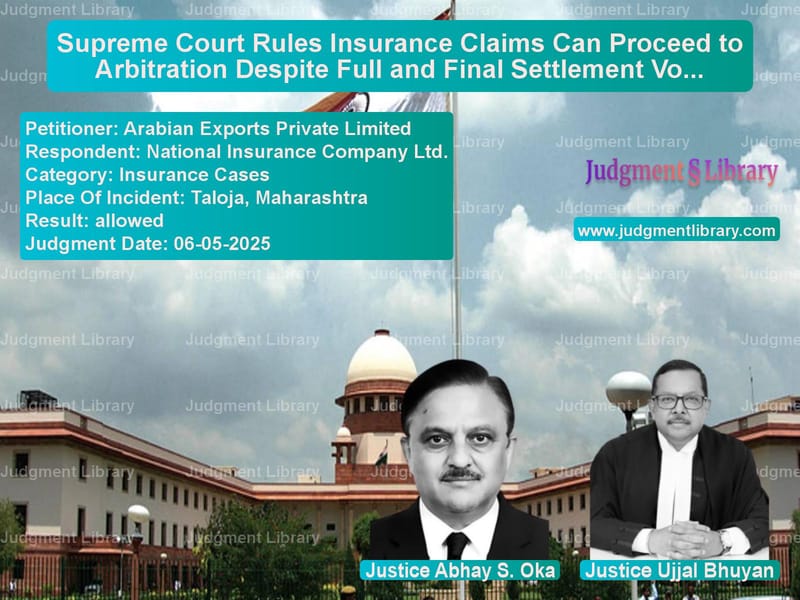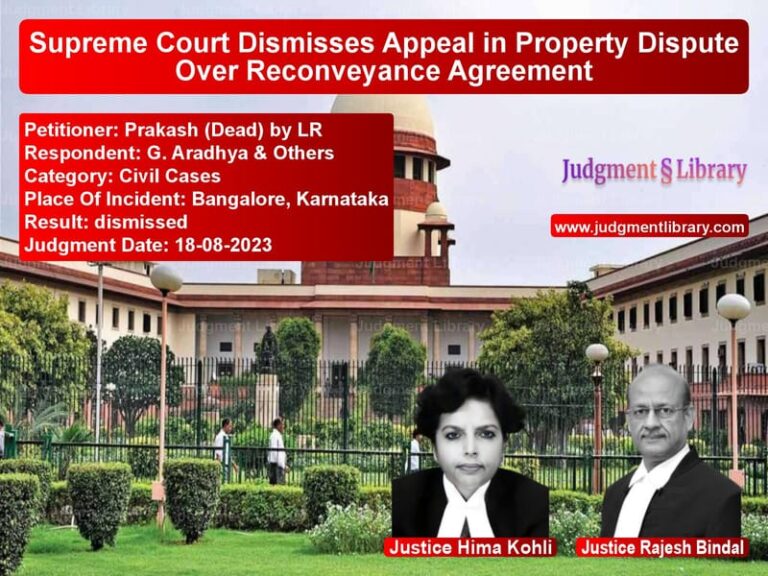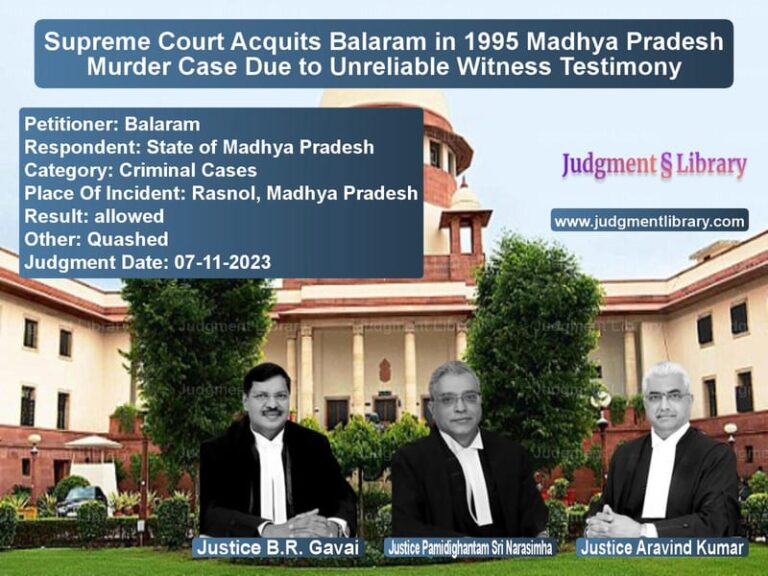Supreme Court Rules Insurance Claims Can Proceed to Arbitration Despite Full and Final Settlement Vouchers
In a landmark judgment that has significant implications for insurance disputes across India, the Supreme Court has delivered a crucial verdict clarifying when policyholders can pursue arbitration even after signing what appears to be a full and final settlement. The case of Arabian Exports Private Limited versus National Insurance Company Ltd. represents a classic scenario faced by many businesses – accepting an insurance payment under financial duress while reserving the right to challenge the adequacy of the settlement. This judgment not only provides relief to the specific company involved but also establishes important legal principles that will guide similar disputes in the future.
The dispute had its origins in the devastating floods that hit Maharashtra in July 2005, particularly the unprecedented rainfall on July 26, 2005, that submerged Arabian Exports’ meat processing plant in Taloja. The company held two insurance policies with National Insurance Company – a Standard Fire and Special Perils Policy covering the plant, machinery, and building for Rs. 3.28 crores, and a Fire Declaration Policy covering stock-in-trade and finished products for Rs. 5.76 crores. The flooding caused extensive damage to both the infrastructure and the stored meat products, leading to claims totaling approximately Rs. 5.71 crores under both policies.
The Long Road to Settlement
What followed the insurance claim was a protracted process that tested the patience and financial resilience of Arabian Exports. The company immediately informed the insurer about the damage on July 29, 2005, and requested appointment of a surveyor. While a surveyor did inspect the facility and acknowledged the loss in a report dated November 29, 2005, the insurance company failed to settle the claim for an extended period. It wasn’t until December 2008 – more than three years after the incident – that the company was presented with a settlement offer.
The insurance company offered Rs. 1.88 crores against the claimed amount of Rs. 5.71 crores and presented Arabian Exports with an “undated and standardized voucher/advance receipt” to sign. Faced with severe financial strain from the unresolved claim and pressure from bankers and creditors, Arabian Exports felt compelled to accept the payment. The company signed the voucher on December 12, 2008, and received the payment on December 19, 2008. However, just five days after receiving the payment, on December 24, 2008, the company wrote to the insurance company reserving its right to invoke arbitration and demanding payment of the balance amount of Rs. 3.83 crores.
The Legal Battle Begins
When the insurance company refused to participate in arbitration, Arabian Exports approached the Bombay High Court under Section 11 of the Arbitration and Conciliation Act, 1996, seeking appointment of an arbitrator. The High Court, however, rejected their application, holding that by accepting the payment and signing the discharge voucher, the company had achieved “full accord and satisfaction” and therefore no arbitrable dispute remained.
This rejection led Arabian Exports to approach the Supreme Court, where the case was heard by a bench comprising Justice Abhay S. Oka and Justice Ujjal Bhuyan. The arguments presented by both sides revolved around a fundamental question: Can a dispute be referred to arbitration after a discharge voucher has been signed, and if so, under what circumstances?
The Arguments Presented
Mr. Kavin Gulati, learned senior counsel for Arabian Exports, presented a compelling case that the settlement was not voluntary but was made under compulsion. He argued that “in the present case, ‘accord and satisfaction’ is not voluntary but under compulsion. Appellant was under financial duress on account of the huge loss caused by the rainwater and flooding; additionally, there was long delay on the part of the respondent in processing the claim. That apart, appellant was pressurized by the banks and creditors for repayment of credit. In such circumstances, appellant had no other option but to sign the undated and standardized voucher/advance receipt for a wholly inadequate amount of Rs. 1,88,14,146.00 against the bona fide claim of Rs. 5,71,69,554.00.”
Gulati drew attention to the company’s letter dated December 24, 2008, and the pleadings in the arbitration applications, which stated: “Looking to the financial strain cast on us by virtue of the willful delay on the part of your organization in settlement at our claims coupled with the pressure exerted by our bankers and creditors, we were left with no option but to sign and submit to you the said undated and standardized voucher on December 12th 2008, for the grossly inadequate amount of Rs. 1,88,14,146.00.”
The senior counsel relied heavily on the Supreme Court’s earlier decision in National Insurance Company Limited Vs. Boghara Polyfab Private Limited, which distinguished between voluntary settlements and those made under economic duress. He also pointed to circulars issued by the Insurance Regulatory and Development Authority of India in 2015 and 2016 clarifying that execution of vouchers as full and final discharge did not foreclose the rights of policyholders to seek higher compensation.
On the other side, Dr. Manish Singhvi, learned senior counsel for National Insurance Company, argued that the case was squarely covered by the three-judge bench decision in Nathani Steels Ltd. Vs. Associated Constructions, which held that “once the parties reach a settlement in respect of any dispute or difference arising under a contract and that dispute or difference is amicably settled by way of a final settlement by and between the parties, unless that settlement is set aside in proper proceedings it cannot lie in the mouth of one of the parties to the settlement to spurn it on the ground that it was a mistake and thereafter proceed to invoke the arbitration clause.”
Dr. Singhvi contended that there was a conflict between the two-judge bench decision in Boghara Polyfab and the three-judge bench decision in Nathani Steels, and therefore the matter should be referred to a larger bench. He further argued that “in so far the present case is concerned, there is no question of any fraud. In fact, there was no pleading and argument as regards fraud. There is also no pleading as to duress or coercion. Mere citation of the expressions fraud, duress or coercion will not make it a case of fraud, duress or coercion. There has to be adequate pleadings. That apart, appellant has not produced any document to even prima-facie show that the appellant was being pressurized by the respondent to enter into a settlement.”
As an alternative prayer, Dr. Singhvi suggested that if the Court believed the High Court had not properly considered the aspect of duress and coercion, the matter could be referred back to the High Court for fresh consideration.
The Supreme Court’s Analysis
The Supreme Court bench carefully examined the legal landscape and the arguments presented by both sides. The Court began by noting the arbitration clause common to both insurance policies, which stated: “If any dispute or difference shall arise as to the quantum to be paid under this policy liability being otherwise admitted such difference shall independently of all other questions be referred to the decision of sole arbitrator…”
The Court then delved into the conflicting precedents. It explained that Nathani Steels involved a situation where “there were negotiations leading to voluntary settlement between the parties in all pending disputes. Thus the contract was discharged by ‘accord and satisfaction’.” However, the Court distinguished this from cases like the present one, where “there would be ‘no dues/claims certificate’ or ‘full and final settlement discharge vouchers’ insisted upon and taken, either in a printed format or otherwise, as a condition precedent for release of the admitted dues.”
The Court clarified that “the observations made that unless the settlement is set aside in proper proceedings, it would not be open to a party to the settlement to invoke arbitration was with reference to a plea of ‘mistake’ taken by the claimant and not with reference to allegations of fraud, undue influence or coercion.”
The judgment extensively referenced the evolution of arbitration law in India, particularly the minimal intervention approach adopted in the Arbitration and Conciliation Act, 1996. The Court cited its decision in Duro Felguera, S.A. Vs. Gangavaram Port Ltd., which held that “courts should look into only one aspect: existence of an arbitration agreement. Already the width of jurisdiction under Section 11(6) of the 1996 Act was considerably wide following judicial dicta but post the aforesaid amendment, all that the courts need to see is whether an arbitration agreement exists – nothing more, nothing less. The legislative policy and purpose is essentially to minimize the court’s intervention at the stage of appointing the arbitrator.”
The Court also relied on the three-judge bench decision in Vidya Drolia Vs. Durga Trading Corporation, which held that “subject matter qua arbitrability cannot be decided at the stage of Sections 8 or 11 of the 1996 Act unless it is a clear case of dead wood. The court under Sections 8 and 11 has to refer a matter to arbitration or to appoint an arbitrator, as the case may be, unless a party has established a prima facie case of non-existence of a valid arbitration agreement. The court should refer a matter if the validity of the arbitration agreement cannot be determined on a prima facie basis. The rule should be: when in doubt, do refer.”
Perhaps most significantly, the Court referenced its recent three-judge bench decision in SBI General Insurance Co. Ltd. Vs. Krish Spinning, which held that “even if the contracting parties in pursuance to a settlement agree to discharge each other of any obligations arising under the contract it is does not ipso facto mean that the arbitration agreement too would come to an end, unless the parties expressly agree to do the same.”
The Court elaborated on this principle: “Thus, even if the contracting parties, in pursuance of a settlement, agree to discharge each other of any obligations arising under the contract, this does not ipso facto mean that the arbitration agreement too would come to an end, unless the parties expressly agree to do the same. The intention of the parties in discharging a contract by ‘accord and satisfaction’ is to relieve each other of the existing or any new obligations under the contract. Such a discharge of obligations under the substantive contract cannot be construed to mean that the parties also intended to relieve each other of their obligation to settle any dispute pertaining to the original contract through arbitration.”
The Court further stated: “Although ordinarily no arbitrable disputes may subsist after execution of a full and final settlement, yet any dispute pertaining to the full and final settlement itself, by necessary implication being a dispute arising out of or in relation to or under the substantive contract, would not be precluded from reference to arbitration as the arbitration agreement contained in the original contract continues to be in existence even after the parties have discharged the original contract by ‘accord and satisfaction’.”
The Court’s Final Ruling
After this comprehensive analysis, the Supreme Court concluded: “In view of the clear legal proposition, we have no hesitation in holding that the High Court was wrong in rejecting the Section 11(6) applications of the appellant. The question as to whether the appellant was compelled to sign the standardized voucher/advance receipt forwarded to it by the respondent out of economic duress and whether notwithstanding receipt of Rs.1,88,14,146.00 as against the claim of Rs. 5,71,69,554.00 the claim to arbitration is sustainable or not are clearly within the domain of the arbitral tribunal.”
The Court set aside the High Court’s order and, recognizing the long lapse of time since the dispute began, appointed Justice (Retd.) Suresh Chandrakant Gupte as the sole arbitrator to resolve the dispute between the parties.
Broader Implications
This judgment has far-reaching implications for insurance disputes and commercial arbitration in India. It firmly establishes that signing a discharge voucher does not automatically extinguish the right to arbitration, particularly when the policyholder alleges that the settlement was made under economic duress, coercion, or undue influence.
The decision reinforces the principle of minimal judicial intervention at the stage of appointing arbitrators, leaving substantive questions about the validity of settlements to the arbitral tribunal itself. This approach aligns with the international trend in arbitration law and supports the doctrine of Kompetenz-Kompetenz, which allows arbitral tribunals to rule on their own jurisdiction.
For policyholders, this judgment provides important protection against insurance companies that might use delaying tactics and financial pressure to force inadequate settlements. It acknowledges the reality that businesses facing financial distress may have no practical choice but to accept whatever payment is offered, while preserving their right to challenge the adequacy of that payment through arbitration.
The Supreme Court’s decision strikes a careful balance between respecting settlements voluntarily entered into and protecting parties from settlements made under duress. By referring the substantive question of whether economic duress existed to the arbitral tribunal, the Court has ensured that Arabian Exports will have its day in court – or rather, before an arbitral tribunal – to present its case for additional compensation.
This judgment will likely become a cornerstone in insurance dispute resolution in India, guiding both policyholders and insurers in understanding their rights and obligations when settlement offers are made and accepted under challenging circumstances.
Petitioner Name: Arabian Exports Private Limited.Respondent Name: National Insurance Company Ltd..Judgment By: Justice Abhay S. Oka, Justice Ujjal Bhuyan.Place Of Incident: Taloja, Maharashtra.Judgment Date: 06-05-2025.Result: allowed.
Don’t miss out on the full details! Download the complete judgment in PDF format below and gain valuable insights instantly!
Download Judgment: arabian-exports-priv-vs-national-insurance-c-supreme-court-of-india-judgment-dated-06-05-2025.pdf
Directly Download Judgment: Directly download this Judgment
See all petitions in Insurance Settlements
See all petitions in Commercial Insurance Disputes
See all petitions in Fire and Property Insurance Cases
See all petitions in Arbitration Awards
See all petitions in Contract Disputes
See all petitions in Judgment by Abhay S. Oka
See all petitions in Judgment by Ujjal Bhuyan
See all petitions in allowed
See all petitions in supreme court of India judgments May 2025
See all petitions in 2025 judgments
See all posts in Insurance Cases Category
See all allowed petitions in Insurance Cases Category
See all Dismissed petitions in Insurance Cases Category
See all partially allowed petitions in Insurance Cases Category







